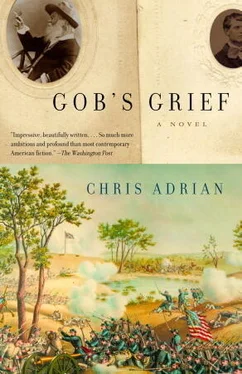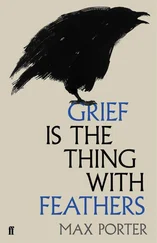But on the evening of January 20, as Walt sat in his favorite (and only) chair, watching the snow fall outside his window, there came a knock at his door. He listened at it a moment and heard voices. A woman was saying, “Are you certain this is the address?” Walt opened the door and saw a regal-looking lady dressed all in blue, with a white tea rose at her throat, with yet another pair of Hankish eyes set in her head. Gob, obscured by her tall chapeau, stepped around her and clasped Walt to his chest.
“Hello, Walt!” he said. “Hello, my friend! Here I am, just as I promised. And here’s my mother, too. Victoria C. Woodhull, but you may call her Empress Eugenie.”
“Really, Gob,” said the lady. She put out her hand and waited patiently for Walt to take it. She stepped into his room, making it seem somehow as if Walt had drawn her in, though it was not his intention to do that.
“Walt,” said Gob. “Get your coat on and don’t be pokey. We’re late for the female convention.” Walt put his coat on, and his shoes, while Victoria Woodhull said various things, none of which he heard very well because of his agitated state. She complimented him on his room, looking around at the dingy walls, the socks drying on the bedpost, and the curtains nailed up on the wall, where they wouldn’t block his light or his view. The thing that ought to have been under the bed was out in full view, and it was brimming. Her glance fell on it and moved on.
“An honest room, Mr. Whitman,” she said. “Simple and austere. Yet when I close my eyes I can feel how it is a palace of wisdom.”
“Considerably less than that,” said Walt. “A lean-to of good sense, perhaps. Or a thatched hut of affability. I don’t often have visitors.”
“Well,” said Mrs. Woodhull. “Come along, then.” She offered Walt her arm — and yet when he took it he got the feeling somehow that he had offered her his — and they were off. It did not occur to Walt to ask where they were going until they were situated in the fine carriage that was waiting outside.
“Where else but the female convention?” said Gob. It became clear that he thought Walt had received a letter detailing the plans for this evening. When he realized Walt had received none such, both he and his mother were embarrassed and apologetic. Mrs. Woodhull offered to return him to his room, but Walt declined. “I like nothing better than a surprise,” he said, which was not entirely true. But this particular surprise — that Gob should appear unexpectedly at his door and pluck him from out of a still pool of sadness — was altogether fine and good.
The three of them proceeded to the National Woman Suffrage Convention, the first ever to be held in the capital. At Carrol Hall, they sat together among a very heterogeneous congregation. There were men and women, whites and Negros, people with a look of wealth about them and people whose clothes declared their poverty. With a rolled-up program, Mrs. Woodhull pointed out those on the stage.
“There’s Mrs. Mott, in the Quaker bonnet. She looks sweet and grannyish, doesn’t she? Well, she is no ordinary granny, though I hear she is sweet-tempered. There is Mrs. Stanton, next to her. Don’t you think, Mr. Whitman, that she looks like a queen?”
“Certainly,” said Walt. Mrs. Stanton did look queenly, with her hair all in white ringlets, and with her nose, the fineness and nobility of which Walt could appreciate even at a distance. And she possessed an enormous, immensely solid-looking bosom, which seemed to him sturdy enough to be the foundation upon which a queendom might be raised. “And there,” he said, “on the end of the platform, with the Eve-like disarrangement of hair, that is Dr. Mary Walker. I knew her during the war, when she was your husband’s colleague.”
“My former husband,” Mrs. Woodhull corrected. “And speaking of men, is that Senator Julian on the right? I understand he is friendly to the cause. That preacher I do not recognize. He is not a Beecher.”
The preacher was finishing up his opening prayer with an ill-considered reference to Eve: he called her Adam’s spare rib. This started a stir which continued through two more speakers. The crowd only quieted when it came Mrs. Stanton’s turn to address them.
“A great idea of progress is near its consummation,” Mrs. Stanton began, “when statesmen in the councils of the nation propose to frame it into statutes and constitutions; when Reverend Fathers recognize it by a new interpretation of their creeds and canons; when the Bar and Bench at its command set aside the legislation of centuries, and girls of twenty put their heels on the Cokes and Blackstones of the past.”
Walt got quite wrapped up in Mrs. Stanton and her speech. He liked her anger and her eloquence and her bosom. She inspired him to get lost in his own fancy, and he pictured her a giantess, one hundred feet high, who waded into the Potomac and launched ship after ship from her rampart breast, a thousand ships each filled with a thousand angry women. These women were about to fire great broadsides of explosive discontent at the capital when Walt was distracted by a pressure on his shoulder. Gob had lobbed his head there and was sleeping soundly.
“My brother died at Chickamauga,” said Gob. “That’s where he died.” He and Walt had adjourned to a saloon after just a few hours of conventioneering. Mrs. Woodhull had stayed on, though she was already belittling the proceedings as a series of teacup hurricanes. “They talk and talk and talk,” she had said, “when they ought to be doing .”
“My brother died in Brooklyn,” said Walt, speaking of Andrew. “With his throat rotted out.” After a bottle of whiskey between them, their conversation had taken a maudlin turn.
“Tomo ran off when we were eleven. Walt, I ought to have been with him. We ought to have been together, there at the end.”
Walt wasn’t much of a drinker, but he tried to keep up with Gob, who seemed to take after his papa, the elder Dr. Woodhull, with respect to liquor. The whiskey had made Walt’s emotions labile and monstrous. He stared at Gob’s sad face, turning over in his mind the idea of him dying, arm in arm, with his twin brother, the two of them riddled identically with bullets, whispering goodbye, goodbye to each other as they drifted off the earth. What a scene — it was enormously horrible and enormously beautiful. It caused him to cry. Hank, drunk too, said, O adhesiveness! O pulse of my life!
“Yes, yes,” said Gob. “My sentiments exactly. I used to cry for it, until it occurred to me that tears do nothing. They comfort the living, but do they appease the dead? Do they want our tears? Is it useful to them that we mourn? Life might spend all its days grieving for lost life. You’d think something could be done with it.”
“All the blood,” said Walt. “All the precious blood. A great work ought to be coming, oughtn’t it?” He was sobbing, uttering a choking call like a hairy animal. It attracted the attention of the other patrons of the saloon, horsecar drivers and conductors all, and many of them Walt’s friends. A few came over to comfort him and glare at Gob. “Walt, is this fellow causing you some upset?” they asked. Walt shook his head, but all the boys kept casting angry looks at Gob, so he and Walt left the place, taking a walk up to the Capitol. As they walked, Walt apologized for the inhospitality of the boys in the saloon. “Everywhere I go I have friends,” he said. “But nobody like you.”
They sat on the steps of the Capitol passing back and forth another bottle.
“Drunker and drunker and drunker and drunker,” said Walt.
“Do you know what I am thinking, Walt?” Gob asked.
“You are thinking of Mrs. Surrat,” said Walt, “because she was hanged over yonder.” He pointed across the snowy grounds, across the street to where the old prison used to stand. “You are thinking, ‘Poor dear, I bet she was just somebody’s dupe.’ And you are thinking how it would upset your mama and all those other sufferables that a woman can hang but she cannot vote. I saw John Surrat’s trial this summer. He is very young. I sat near him. It was hot in the courtroom, and he kept me cool with his big palm-leaf fan.”
Читать дальше












